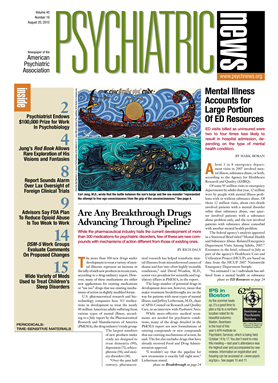Despite a large and expanding need for effective autism treatments, few new treatments are under development for the condition. And that's unlikely to change until researchers better define autism's etiology and mechanisms and devise precise tests or markers to medically diagnose the condition.
Currently, there are only nine medications for autism spectrum disorder approved by the Food and Drug Administration, and only nine more are in various stages of clinical or preclinical development, according to Life Science Analytics, which tracks the new-drug market. That compares with 313 medicines under development to treat all forms of mental illness, according to a July report by the Pharmaceutical Research and Manufacturers of America (PhRMA), the drug industry trade group (see
Are Any Breakthrough Drugs Advancing Through Pipeline?).
Sarah Terry, president of Life Science Analytics, told Psychiatric News that the dearth of autism drugs is primarily because autism “is not very well understood [and] it's somewhat seen as a syndrome and constitutes different symptoms.”
The development of medications for the disorder is very difficult because researchers have been unable to pinpoint autism's mechanism of disease or even how to diagnose reliably a child with the disorder.
Those research challenges have led drug makers to avoid autism-drug research because of the average $1.3 billion cost and a commitment of up to 15 years to bring a new drug to market, according to the PhRMA report.
“Very few companies are playing there because it is high risk, and we're still in the bench-science stage of understanding the disease,” said Terry. Autism drug development is consequently “very, very sparse,” she noted.
The continuing dearth of medical treatments comes despite a growing need for such treatment. On average, 1 in 110 American 8-year-olds had an autism spectrum disorder in 2006, an increase of 57 percent since 2002, according to a December 2009 report by the Centers for Disease Control and Prevention.
“There is an enormous need for autism treatments,” said Jeffrey Lieberman, M.D., chair of APA's Council on Research and Quality Care, in an interview with Psychiatric News.
Autism advocates hope that more of the basic science underlying the disease will be revealed by ongoing federal research authorized under the Combating Autism Act (S 843), which President George W. Bush signed in December 2006. The law authorized nearly $1 billion over five years for research by the National Institutes of Health on the causes of autism, possible interventions, and effective early detection of the disorder.
